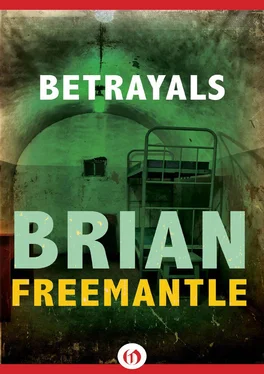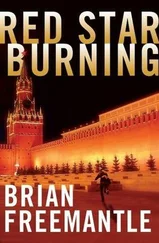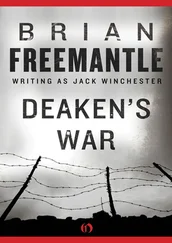Brian Freemantle - Betrayals
Здесь есть возможность читать онлайн «Brian Freemantle - Betrayals» весь текст электронной книги совершенно бесплатно (целиком полную версию без сокращений). В некоторых случаях можно слушать аудио, скачать через торрент в формате fb2 и присутствует краткое содержание. Жанр: Триллер, на английском языке. Описание произведения, (предисловие) а так же отзывы посетителей доступны на портале библиотеки ЛибКат.
- Название:Betrayals
- Автор:
- Жанр:
- Год:неизвестен
- ISBN:нет данных
- Рейтинг книги:5 / 5. Голосов: 1
-
Избранное:Добавить в избранное
- Отзывы:
-
Ваша оценка:
- 100
- 1
- 2
- 3
- 4
- 5
Betrayals: краткое содержание, описание и аннотация
Предлагаем к чтению аннотацию, описание, краткое содержание или предисловие (зависит от того, что написал сам автор книги «Betrayals»). Если вы не нашли необходимую информацию о книге — напишите в комментариях, мы постараемся отыскать её.
Betrayals — читать онлайн бесплатно полную книгу (весь текст) целиком
Ниже представлен текст книги, разбитый по страницам. Система сохранения места последней прочитанной страницы, позволяет с удобством читать онлайн бесплатно книгу «Betrayals», без необходимости каждый раз заново искать на чём Вы остановились. Поставьте закладку, и сможете в любой момент перейти на страницу, на которой закончили чтение.
Интервал:
Закладка:
“I said I didn’t care.”
“That’s stupid, which is something else you know,” her father said, still not raising his voice. “And again you’ve misunderstood. Let’s not think of physical danger for a moment, although of course we should. You’re a woman. What sort of chance do you really think a woman-any woman-would stand of achieving anything in any sort of Middle East situation?”
“I know the area and I know the language and I know the dangers and the likely difficulties,” insisted Janet.
“You’re still a woman.”
“A very determined one.”
He shook his head, more in sadness than refusal. “I do care,” he said. “I care and I feel sorry-desperately sorry-for what’s happened. Your mother and I liked John enormously and hoped, really hoped, that you were going to get a second chance. But this isn’t the way, darling. Leave it to the people who know what they’re doing: you really could do more harm-harm to John, I mean-than good by trying to get involved like this.”
Janet’s eyes clouded with anger. “You know what you’ve just done!” she said. “You’ve just talked of John in the past tense, like he’s already dead and there’s no possibility of our ever marrying: that I’ve lost the second chance. And you’ve lectured me like Willsher, the CIA man. Patronized me and patted me on the head and told me to go home and be a good girl and stop making a nuisance of myself. I haven’t had to wait until I got to the Middle East to be treated like a second-class person. From you, of all people, I didn’t expect that: neither attitude!”
Her father went to the drinks tray and refilled his glass, without inviting her to have another. Still standing by it, he said: “I’m sorry. I did not intend to talk of John as if he were dead. I didn’t intend to patronize, either.”
“I will go,” insisted Janet. “Whether you help me or not, I will go.”
“Yes,” accepted her father, shortly. “You will, won’t you?”
“So?”
“So what?”
“Do I get help or do I get patronized?”
“Do you really have to ask a question like that?”
“After tonight I’m not sure.”
“What’s this sort of conversation going to achieve?”
Janet shrugged, regretting the outburst. “I’m fed up, Daddy: so fed up! I love John and I really do think of it as a second chance and I want it so very much. So I’m fed up being told to go away: being told that everyone else knows better than me. That I haven’t the right to know anything, even!”
Her father moved from where he stood, coming to her and pulling her to him. “You know I’ll do everything I can.”
Janet twisted, to look up at him. “I’m sorry,” she said.
He shook his head, dismissing her apology. “Don’t regard it as anything more than it is,” he cautioned. “I don’t know yet whether anyone I know personally is in any position to help. Or if they will, if they are.”
“It’s good just to have someone on my side,” she said.
“I’ll always be that,” her father said.
Janet was further encouraged the following day, when her father emerged from his study after an entire morning’s telephoning, to announce that he had located two old diplomatic acquaintances, one in London, the other working out of the British embassy in Nicosia.
“Cyprus!” exclaimed Janet.
“It isn’t significant,” warned her father. “We don’t know yet if he’ll be prepared to do anything.”
“It’s wonderful!” insisted Janet, refusing to be disheartened.
Depression was, however, a feeling that was quick to come. Her father’s friend in London was named McDermott, and he’d served under her father at the British embassy in Cairo. They met not at Whitehall but over lunch at Lockett’s, nearby. He was a tall, thin, pink-cheeked man with the habit of looking reprovingly, like some schoolmaster, over half-rimmed spectacles. The frames had grooved the bridge of his nose and the sides of his head, where his hair was white. He said he remembered Janet from her Cairo visits during school vacations and she smiled, unable to remember him, and agreed that Egypt had been a fascinating country. He’d read of Sheridan’s kidnap but had not realized her association, because she had been referred to in all the newspaper stories by her previously married name. He was sorry. He said the situation in the Lebanon appeared, regrettably, quite intractable and ordered gulls’ eggs, with lemon sole to follow.
McDermott seemed genuinely surprised at the request for assistance, which her father introduced into the conversation and which Janet at once took up and expanded upon, elaborating the early, first-night debate with her father.
When she finished McDermott said at once and again apparently genuinely: “Why are you asking me to do this?”
“I would have thought that was obvious,” said Janet.
McDermott put down his knife and fork, not immediately looking up, assembling his words. When he did speak, it was to her father rather than to Janet, and Janet thought again that she didn’t have to wait until the Middle East to encounter the dismissive relegation of her sex.
“You should know better than to ask me!” said McDermott. “John Sheridan is a foreign national, an American. What right has the Foreign Office to interfere!”
The same rejection, only reversed, that she’d encountered on her first approaches to the State Department and the CIA, remembered Janet: it was like being on a roundabout with a forwards-and-backwards control, but always in the same direction.
“We were thinking of it more as a personal favor,” said her father. “A discreet sort of inquiry.”
“There is no such thing in the Lebanese hostage situation,” lectured McDermott. “We’ve had the special envoy of the Archbishop of Canterbury held for over a year! A British television journalist for two. How on earth can I get involved, risk tangling up whatever negotiation might be going on to gain the freedom of Britons, by intruding into the affairs of another country? It’s unthinkable!”
“It wasn’t our intention to embarrass you,” said Janet’s father, diplomat soothing diplomat.
McDermott retrieved his knife and fork. “This is a social occasion,” he said. “Nothing official. So there is no embarrassment.” He looked at last to Janet. “Please don’t think I’m not sympathetic. I am. I recognize very well the predicament in which you find yourself: that you’re in a kind of limbo. But there is nothing I can do, either officially or unofficially.”
“You’ve made that very clear,” said Janet, tightly.
“Can I give you some advice?” asked the man.
“Of course,” said Janet, knowing he would whether she agreed or not.
“Leave it to the experts who know what they are doing,” smiled McDermott.
“Like your experts know what they are doing, with an Archbishop’s enjoy still held after one year! And a TV journalist for two!” snapped Janet.
Red spots of irritation pricked out on McDermott’s face, but his voice was completely even when he spoke. He said: “I understand your distress. I wish there were something I could do. I really do.”
What did it take to get men like McDermott and her father to lose control, Janet wondered. Perhaps their lives were too well cocooned for the risk ever to arise. Striving for politeness, Janet said: “Thank you, for agreeing to meet me at least.”
McDermott’s attention was back to the other man. “Always a pleasure to meet old and respected friends,” he said. “The food here is always very good, don’t you think?”
“Very good,” echoed her father.
It was an absurd, esoteric game with no written rules, thought Janet, the exasperation burning through her. She wondered what John thought of the food he was getting, in whatever shithole he was tethered.
Читать дальшеИнтервал:
Закладка:
Похожие книги на «Betrayals»
Представляем Вашему вниманию похожие книги на «Betrayals» списком для выбора. Мы отобрали схожую по названию и смыслу литературу в надежде предоставить читателям больше вариантов отыскать новые, интересные, ещё непрочитанные произведения.
Обсуждение, отзывы о книге «Betrayals» и просто собственные мнения читателей. Оставьте ваши комментарии, напишите, что Вы думаете о произведении, его смысле или главных героях. Укажите что конкретно понравилось, а что нет, и почему Вы так считаете.












